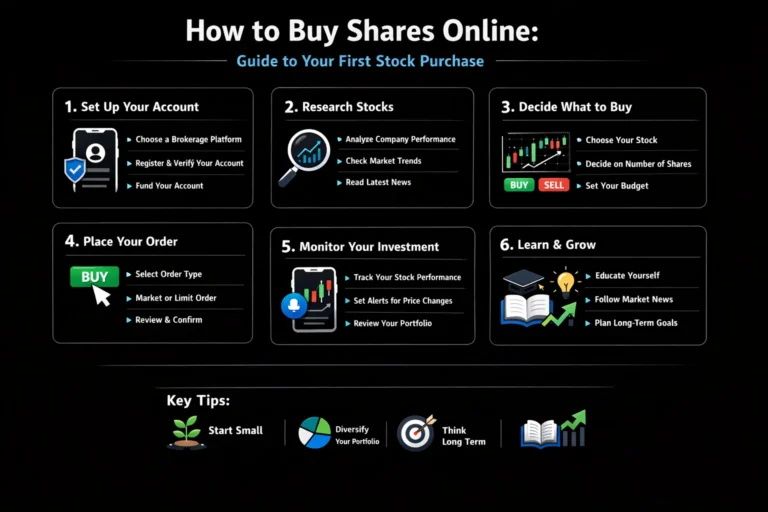
What Is Money Market Fund and How Can They Work For You
Money market funds are a type of mutual fund designed for investors seeking a safe and liquid place to park their cash. They invest in high-quality, short-term debt instruments, offering stability and easy access to funds, making them a cornerstone of conservative investment and cash management strategies.
For investors in the US, UK, Canada, and Australia, money market funds are a fundamental tool for holding cash within brokerage accounts, often yielding more than a standard savings account while maintaining a stable net asset value (NAV). Entities like the SEC in the US and the FCA in the UK provide stringent regulations for these funds, ensuring their safety and integrity.
Summary Table
| Aspect | Detail |
|---|---|
| Definition | A money market fund is a type of mutual fund that invests in high-quality, short-term debt securities and cash equivalents, aiming to provide high liquidity with a very low level of risk. |
| Also Known As | MMFs, Money Funds, Cash Management Funds |
| Main Used In | Cash Management, Emergency Funds, Temporary Holding Position, Conservative Investing |
| Key Takeaway | Money market funds are prized for their capital preservation and liquidity, but they are not FDIC-insured and their yields fluctuate with interest rates. |
| Formula | N/A (The key metric is the 7-Day SEC Yield) |
| Related Concepts |
What is a Money Market Fund
A money market fund is a type of fixed-income mutual fund that invests in debt securities characterized by their short maturities and minimal credit risk. Think of it as a pool of money from thousands of investors that is used to buy a collection of ultra-safe, short-term IOUs from governments, banks, and highly rated corporations. Unlike a stock fund, the primary goal isn’t growth but capital preservation and liquidity. They are designed to be a “cash equivalent,” allowing investors to earn a small return on idle cash without subjecting it to the volatility of the stock or long-term bond markets.
If your savings account is a piggy bank, a money market fund is a high-security, interest-bearing vault managed by professionals who lend your money out in very short, very safe bursts to various entities.
Key Takeaways
The Core Concept Explained
Money market funds work by aggregating capital from investors to purchase a diversified portfolio of short-term debt. The “money market” itself is a wholesale market for these instruments. By pooling funds, individual investors gain access to these high-denomination securities that would otherwise be out of reach.
The fund’s net asset value (NAV) is typically kept stable at $1.00 per share. This is achieved by investing in securities that mature in 60 days or less on average, minimizing the impact of interest rate changes on the portfolio’s value. The income generated by the fund’s holdings (the interest payments) is distributed to shareholders as dividends, which constitutes the yield you earn.
A high yield indicates the fund is invested in instruments paying higher interest, often reflecting a period of rising rates. A very low yield, as seen for years following the 2008 financial crisis, reflects a low-interest-rate environment. The key metric to watch is the 7-Day SEC Yield, which annualizes the fund’s earnings over the past week, giving a standardized way to compare different funds.
How Do Money Market Funds Generate Returns
While there’s no single “formula” for a money market fund’s value, their returns are driven by the interest income from their underlying holdings. The key metric for investors is the 7-Day SEC Yield.
This yield is calculated as follows: The fund takes its net investment income earned over the last seven days, subtracts its expenses, and then annualizes this figure (assuming the income is compounded each week for a year). It provides a standardized measure to compare the potential returns of different money market funds.
The Building Blocks of a Money Market Fund
A fund’s portfolio is constructed from several types of high-quality, short-term debt:
- Treasury Bills (T-Bills): Short-term U.S. government debt, considered virtually risk-free.
- Certificates of Deposit (CDs): Time deposits from banks.
- Commercial Paper: Short-term, unsecured promissory notes issued by large corporations to finance their immediate needs (e.g., payroll, inventory).
- Repurchase Agreements (Repos): Short-term loans collateralized by government securities.
- Bankers’ Acceptances: Short-term debt instruments used to finance international trade.
For example, a US-based investor might see a fund from Vanguard or Fidelity that holds T-Bills issued by the U.S. Treasury, commercial paper from a blue-chip company like Microsoft, and CDs from JPMorgan Chase. The yield on this fund would be closely tied to the Federal Funds Rate set by the Fed.
Strategic Applications and Risk Management for Modern Investors
| Strategy | Description & Purpose | Ideal For |
|---|---|---|
| Core Operational Cash Hub | Use a Government MMF for immediate liquidity needs and a Prime MMF for a portion of cash not needed for 30-60 days to capture slightly higher yield. | Businesses, active traders managing collateral, and investors with frequent cash movements. |
| Tax-Advantaged Cash Allocation | Simultaneously use a Municipal MMF (for federal/state tax exemption) in a taxable brokerage account and a Prime MMF in a tax-advantaged account (like an IRA) where earnings are already tax-deferred. | High-net-worth individuals in upper tax brackets seeking to optimize after-tax returns on idle cash across all accounts. |
| Risk Mitigation & Due Diligence Check | Beyond checking the 7-Day SEC Yield, investors must review a fund’s credit quality profile (percentage in government vs. commercial paper), weighted average maturity (WAM), and expense ratio. A shorter WAM (e.g., 30 days) means lower interest rate risk. | All investors, especially after events like the 2008 “breaking the buck,” to understand the subtle risks behind the stable $1 NAV. |
Key Insight: MMFs are not just passive holding tanks. A strategic approach involves aligning specific fund types (Government, Prime, Municipal) with specific cash needs and account types to balance liquidity, after-tax yield, and risk.
Beyond the Basics: Navigating the Interest Rate Environment
While the article notes that yields fluctuate with rates, this section provides a actionable framework for investors in different monetary policy cycles.
- In a Rising Rate Environment (e.g., 2022-2023):
- Action: Favor Prime MMFs. Their holdings (commercial paper, CDs) reprice quickly, allowing you to capture yield increases faster. Be mindful of slightly increased credit risk.
- Monitor: The Federal Reserve’s forward guidance. Steady hiking cycles can make MMFs attractive alternatives to longer-term bonds.
- In a Stable or Peak Rate Environment:
- Action: Compare MMF yields against short-term Treasuries (e.g., 3-month T-bills) and high-yield savings accounts (HYSAs). Sometimes direct purchases or HYSAs may offer better yields with similar or less risk.
- Monitor: The yield curve. An inverted curve can sometimes make longer-maturity MMF holdings less attractive.
- In a Falling Rate Environment:
- Action: Consider locking in longer-term CDs or Treasury notes if you don’t need immediate liquidity for a portion of your cash. MMF yields will decline.
- Monitor: Fund expense ratios. As yields compress, high fees eat a larger percentage of your return. Switch to ultra-low-cost fund providers.
Key Insight: An investor’s approach to MMFs should not be static. Proactive management based on the interest rate outlook and relative value comparisons can significantly enhance cash returns over time.
The Institutional Perspective: Why MMFs Are a Systemic Financial Tool
The article touches on use by corporations. This section delves deeper into the critical, large-scale roles MMFs play in global finance, explaining their importance beyond individual investing.
- Short-Term Funding for Corporations & Governments: MMFs are major buyers of commercial paper and municipal notes. This provides essential operating capital for companies to manage payroll and inventory, and for cities to fund projects. Their demand helps keep short-term borrowing costs lower for these entities.
- Liquidity Management for Institutional Portfolios: Pension funds, insurance companies, and endowments use MMFs as a “cash buffer” for upcoming liabilities (like pension payments). The scale is immense, with institutions moving billions daily to manage duration and liquidity risk.
- Collateral and Settlement in Financial Markets: MMF shares are often used as high-quality, liquid collateral in repurchase agreements (repos) and derivatives transactions. This function is crucial for the smooth operation and stability of the broader financial system.
Key Insight: The stability and liquidity of MMFs make them a key cog in the financial system’s plumbing. Regulatory changes post-2008 (like liquidity gates and fees in stress periods) were designed not just to protect retail investors, but to prevent systemic risk from MMF redemptions freezing corporate credit markets.
Practical Takeaway for All Investors: Understanding this systemic role underscores why regulators scrutinize MMFs so heavily. It also means that during times of financial stress, news about MMFs can move markets, making it an asset class worth watching even for long-term equity investors.
The Different Types of Money Market Funds
Not all money market funds are created equal. Understanding the three primary types can help you choose the one that best aligns with your risk tolerance and tax situation.
- Government and Treasury Money Market Funds:
- What they hold: Primarily U.S. Treasury securities and repurchase agreements collateralized by Treasuries.
- Key Feature: Highest level of safety. The credit risk is essentially zero as it’s backed by the full faith and credit of the U.S. government.
- Tax Benefit: The dividends are often exempt from state and local income taxes.
- Best For: The most conservative investors and those in high-tax states.
- Prime Money Market Funds:
- What they hold: A mix of commercial paper from corporations, CDs from banks, and some government securities.
- Key Feature: Typically offers a slightly higher yield than government funds to compensate for taking on slightly more credit risk.
- Tax Consideration: Dividends are fully taxable at the federal, state, and local levels.
- Best For: Investors seeking the highest possible yield from a money market fund and who are comfortable with minimal additional risk.
- Municipal (Tax-Exempt) Money Market Funds:
- What they hold: Short-term debt issued by state and local governments (municipalities).
- Key Feature: The dividends are exempt from federal income tax and may be exempt from state and local taxes if you live in the state of issuance.
- Best For: Investors in the highest federal tax brackets for whom the tax-equivalent yield is more attractive than the yield on taxable funds.
Why Money Market Funds Matter to Traders and Investors
Money market funds play a critical, practical role in the financial ecosystem by offering a safe harbor for cash that provides a better return than idleness.
- For Traders: They serve as an ideal “parking spot” for proceeds from stock sales while waiting for the next investment opportunity. This ensures cash remains productive instead of sitting dormant. They are also used to hold collateral.
- For Investors: They are a perfect component for an emergency fund, providing stability and immediate access without the volatility of the market. Conservative investors use them to preserve capital for short-term goals like a down payment on a house or a major purchase within the next 1-3 years.
- For Businesses and Institutions: Corporations use them to manage their massive cash reserves efficiently, earning a small return on operating capital before it’s needed for expenses.
How to Use Money Market Funds in Your Strategy
Use Case 1: The Emergency Fund Hub
Instead of keeping your 3-6 months of living expenses in a checking account earning zero interest, you can allocate it to a money market fund. The money remains highly liquid for unexpected events, but it earns a yield that can help offset inflation. For instance, you could sell shares in your fund and have the cash in your bank account within a day or two.
Use Case 2: The Tactical Trader’s Holding Pen
After selling a stock position, you can move the cash into your brokerage’s “sweep” money market fund automatically. This allows you to earn a return while you research your next trade, instead of letting the cash sit idle. Many brokerages like Charles Schwab and E*TRADE offer this feature by default.
Use Case 3: Saving for a Short-Term Goal
If you are saving for a goal like a vacation, a new car, or a down payment in the near future, a money market fund provides a safer alternative to the stock market. You avoid the risk of a market downturn derailing your plans just as you need the money.
To start using money market funds, you’ll need a brokerage account that provides access to them. We’ve reviewed the best platforms for cash management and investing to help you choose the right one.
- High Safety: Investments are in top-tier, short-term debt, leading to exceptional capital preservation.
- Superior Liquidity: Offers easy and quick access to your funds, often with check-writing privileges.
- Better Returns: Typically offers higher yields than standard savings or checking accounts.
- Diversification: Gain instant diversification across many securities, reducing individual issuer risk.
- Professional Management: Fund managers handle the complex process of security selection.
- No FDIC Insurance: They are not bank deposits and are not federally insured.
- Inflation Risk: Returns may not keep pace with inflation, eroding purchasing power.
- Low Return Potential: They are not growth investments and offer minimal returns.
- Interest Rate Risk: While minimal, yields can lag in a rising rate environment and fall when rates drop.
- Fees: Expense ratios can eat into your returns, especially in a low-yield environment.
Choosing the Right MMF: A Decision Framework
| Decision Factor | Questions to Ask | Fund Type Recommendation | Rationale |
|---|---|---|---|
| Primary Goal & Time Horizon | Is this for an emergency fund, a specific short-term goal, or idle cash in a brokerage account? When will you likely need the money? | All MMFs are suitable. Government funds for absolute safety; Prime for slightly higher yield on cash not needed immediately. | The core purpose is capital preservation and liquidity for needs within 0-3 years. |
| Tax Bracket | What is your combined federal and state income tax bracket? | Compare the Tax-Equivalent Yield (TEY) of a Municipal MMF to the SEC yield of taxable funds. High-bracket investors often benefit from Municipals. | A Municipal fund’s tax-exempt yield can provide a higher after-tax return, even if its stated yield is lower. |
| Risk Tolerance | How would you react to a remote event like a fund “breaking the buck”? Is absolute principal stability paramount? | Government/Treasury MMF. Avoids commercial paper, offering the highest credit quality. | Eliminates exposure to corporate credit risk, providing maximum peace of mind in exchange for a marginally lower yield. |
| Account Type | Is the cash held in a taxable brokerage account or a tax-advantaged account (like an IRA)? | Use Prime MMFs in IRAs (tax-deferred anyway). Use Government or Municipal MMFs in taxable accounts based on tax bracket. | Optimizes asset location. There’s no tax benefit to using a Municipal fund in an account that is already tax-sheltered. |
Key Action: Before investing, calculate the Tax-Equivalent Yield of a municipal fund using the formula: TEY = Municipal Yield / (1 – Your Federal Tax Rate). Compare this result to the SEC yield of Prime or Government funds.
Beyond Parking Cash: MMFs in a Comprehensive Portfolio Strategy
Money market funds are often seen in isolation as a cash tool. However, they play several strategic roles within a broader, multi-asset investment portfolio.
- The Strategic Dry Powder Reserve
For disciplined investors, an MMF is not just a parking spot but a strategic reserve for opportunistic buying. By automatically sweeping dividends and sale proceeds into an MMF, you build a pool of liquid capital. This allows you to deploy funds during market downturns without having to sell other assets at a loss, effectively practicing “cash-averaging” into opportunities.
- The Portfolio Stabilizer and Volatility Buffer
In a portfolio containing stocks and long-term bonds, allocating a portion (e.g., 5-15%) to MMFs reduces overall portfolio volatility. While it may lower long-term returns, it provides stability and accessible funds for rebalancing. When equities fall, you can use MMF holdings to “buy low” as part of a regular rebalancing strategy, forcing disciplined contrarian action.
- The Bridge for Liability Matching
For retirees or those with known, near-term expenses (e.g., college tuition, a property down payment), MMFs act as a perfect “bridge” investment. Funds for expenses due in the next 1-3 years can be held in an MMF, shielding them from market volatility that could affect a stock or bond portfolio. This allows the remainder of the portfolio to stay invested for long-term growth without urgency.
Key Insight: Elevating an MMF from a mere savings account substitute to an integrated portfolio tool transforms it from passive to active. It becomes a source of stability, opportunity, and disciplined financial management.
Money Market Funds in the Real World: The 2008 Crisis and The 2023 Resurgence
The most famous real-world example of money market fund risk occurred during the 2008 financial crisis. The Reserve Primary Fund, one of the oldest money market funds, “broke the buck.” It held a significant amount of commercial paper from Lehman Brothers, which became worthless when Lehman collapsed. This caused the fund’s NAV to fall to $0.97, meaning investors lost 3 cents on the dollar. This event triggered a massive run on other prime money market funds, freezing credit markets and prompting a $1 trillion U.S. government guarantee program to stabilize the industry.
Conversely, the period of 2022-2024 provides a positive example of their utility. As the Federal Reserve aggressively raised interest rates to combat inflation, money market fund yields surged from near 0% to over 5%. This led to a massive inflow of cash from investors seeking a safe haven that also offered a attractive, liquid return. According to the Investment Company Institute, assets in money market funds reached a record high of over $6 trillion in 2023.
Money Market Funds vs High Yield Savings Account
A common point of confusion is the difference between a money market fund and a high-yield savings account (HYSA). Both offer liquidity and safety, but they have distinct characteristics.
| Feature | Money Market Fund | High-Yield Savings Account |
|---|---|---|
| Insurance/Protection | Not FDIC-insured. Subject to market and credit risk (however minimal). | FDIC-insured up to $250,000. Principal is guaranteed. |
| Access to Funds | Trades settle in 1-2 business days. May offer check-writing. | Instant internal transfers. External transfers take 1-3 days. |
| Potential Return | Yield fluctuates daily with market interest rates. | Interest rate is set by the bank and can change. |
| Primary Use | Active cash management within an investment portfolio. | Everyday savings; emergency fund held at a bank. |
Conclusion
Ultimately, money market funds are an essential tool for prudent cash management within a broader financial strategy. They excel at providing a safe, liquid, and relatively productive holding ground for cash that you cannot afford to risk in the markets. While they are not designed for growth and lack FDIC insurance, their advantages in capital preservation and accessibility are unmatched by most other liquid instruments. By incorporating a money market fund as your emergency fund hub or a tactical holding account, you can ensure your cash is never idle and is always working for you, even if just a little. Start by checking the sweep fund options in your existing brokerage account or comparing the 7-Day SEC Yields of prominent funds from providers like Vanguard, Fidelity, and Schwab.
Ready to put your cash to work? Choosing the right platform is the first step. We’ve meticulously reviewed the best brokerage accounts for cash management to help you find one with competitive money market fund yields and low fees.
Related Terms:
- Liquidity: The ease with which an asset can be converted into cash. Money market funds are the epitome of a liquid investment.
- Bond Funds: Mutual funds that invest in longer-term debt securities. They offer higher yield potential but carry more interest rate risk and price volatility than money market funds.
- Net Asset Value (NAV): The per-share value of a mutual fund. Money market funds strive to maintain a stable NAV of $1.00.
- SEC Yield: The standard measure for comparing bond and money market fund yields, based on the most recent 7-day period.
Frequently Asked Questions
Recommended Resources
- The U.S. Securities and Exchange Commission’s Information on Money Market Funds provides authoritative regulatory background.
- Investopedia’s Money Market Fund Definition is a great place for a quick refresher on the core concepts.
- The Investment Company Institute’s Money Market Fund Data offers up-to-date statistics on fund flows and assets, providing a macro view of the industry.





